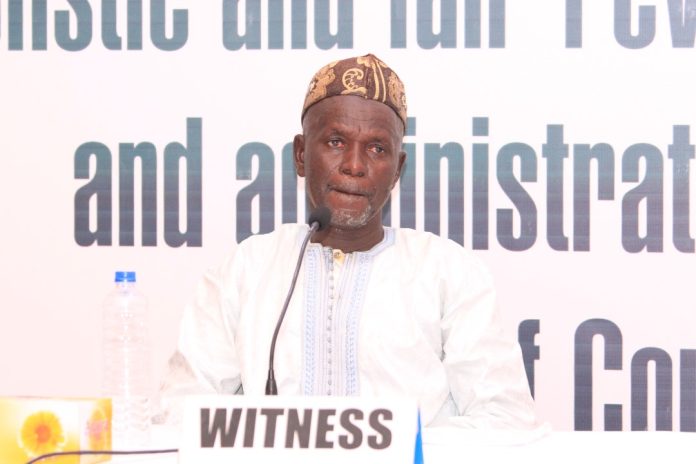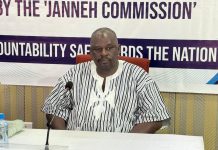By Yankuba Jallow
Malamin I.L. Bojang, former Chairman of the Kerewan Area Council, on Wednesday reappeared before the Local Government Commission of Inquiry to face a barrage of tough questions from Lead Counsel Patrick Gomez over audit findings that uncovered widespread financial mismanagement, poor oversight, and millions of dalasis in unaccounted public funds.
Bojang, who chaired the council between 2018 and 2023, was asked to explain the council’s failure to take meaningful action followingfindings in both the 2018–2019 and 2020–2021 National Audit Office reports. In one instance, Lead Counsel Gomez pointed out that payments amounting to D807,335 were made without adequate supporting documents—a practice auditors said was likely more extensive due to their reliance on sampling methods.
“What this tells you is that the number is definitely higher because they do sampling,” Gomez said. “The CEO and the Finance Director are not following accounting procedures in authorising payments and so they are definitely causing council financial loss.”
Bojang responded that these were “technical problems” and blamed the lapses on unqualified accounting staff. “I fight tooth and nail,” he said. “A man like me in the accounting field—if I realise there is no supporting document—how do you expect an auditor to justify that payment?”
He admitted that during his tenure, the council failed to enforce accountability. “We will be talking in council meetings,” Bojang said, “but no action was taken.” He blamed the problem partly on the fact that many senior officers, including directors of finance, had risen through the ranks without formal accounting qualifications. “They rise up from collector and get promoted—that is one problem,” he said.
Gomez pressed further, suggesting that the problems were not just technical but also stemmed from a lack of will to implement the law. “We have substandard people managing offices. It’s not nice to say—but it’s the reality,” he said. “Everybody knows there is a financial manual, the Local Government Act. Nobody cares about it.”
He also highlighted structural weaknesses in local governance, including the ineffectiveness of the council’s own disciplinary and establishment committees. Gomez said the quality of councillors and council staff alike contributed to a cycle of poor governance. “If the finance committee did not do their responsibility or are not aware of the Acts, how do you think they can manage finances?” he asked.
Bojang agreed, saying that the low level of education among staff and councillors was a major obstacle to proper administration. He called for the introduction of salaries for councillors to attract more qualified candidates. “Right now, they are given just D6,000 as allowance,” he said. “When I joined, it was D5,000. It is not enough.”
Gomez pointed out that without strong oversight, corruption becomes inevitable. “Some things are so basic,” he said. “You are coming to Council, you go through elections, and you tell people you will manage their affairs. But everything matters—except the law.”
He then read directly from the National Audit Office report, which issued an adverse opinion on the council’s financial statements. The report stated that the financial records were so poor that the auditors could not even form an opinion on their accuracy.
Other audit findings included over D863,568 in understatement of bank balances, and over D4 million in direct transfers that were never recorded in the cashbook or financial statements. Gomez asked Bojang whether the council had ever demanded an explanation from the CEO or Director of Finance regarding these discrepancies.
“It is really humiliating to have such results,” Bojang said. “You know you are in charge of public funds. If understatement is done, what explanation will you give?”
The former chairman also admitted that corruption within the councils would not end simply through training. He acknowledged that people were more aware now thanks to the Commission’s work, but added that “unless there is an independent disciplinary body,” lasting reform would be difficult.
“People now know what they’ve done. They are being exposed. They’re faced with the whole world telling them what they did,” he said. “That’s enough to stop corruption—or at least reduce it.”
Lead Counsel Gomez wrapped up by saying that no area council in the country could claim to have served its people the way it should. “They can do way better,” he said. “If you build one school, you could have built ten. But the people keep suffering at the expense of those who either don’t know what they’re doing or do the opposite intentionally.”
The Commission expects Bojang to submit additional documents early next week.



















